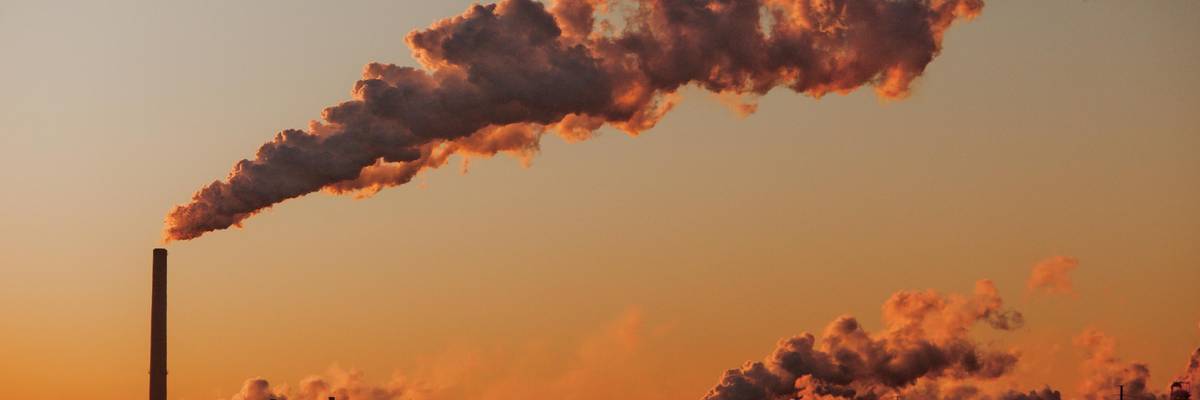

SUBSCRIBE TO OUR FREE NEWSLETTER
Daily news & progressive opinion—funded by the people, not the corporations—delivered straight to your inbox.
5
#000000
#FFFFFF
To donate by check, phone, or other method, see our More Ways to Give page.


Daily news & progressive opinion—funded by the people, not the corporations—delivered straight to your inbox.

A pair of progressive U.S. senators introduced legislation to stop big banks from financing fossil fuel projects on November 5, 2021. (Photo: kris krug/Flickr/cc)
As the ongoing COP26 climate summit draws attention to the financial institutions that enable fossil fuel companies to keep wrecking the planet, a pair of progressive U.S. senators on Friday introduced a bill that would force big banks to stop pouring money into the destructive industry.
"Regulators' refusal to rein in Wall Street's reckless risk-taking drove our economy off a cliff in 2008, and now, Wall Street's climate-risky behavior could lead to an even bigger financial disaster."
The Fossil Free Finance Act, sponsored by Democratic Sens. Ed Markey (Mass.) and Jeff Merkley (Ore.), would require the Federal Reserve to impose new restrictions on major banks and other systemically important financial institutions (SIFIs) to cut off funding for projects that produce planet-heating emissions.
"In order to reduce emissions and combat climate change, we need to stop throwing money at dirty fossil fuel projects," said Markey, chair of the Senate Environment and Public Works Committee's panel on climate change, clean air, and nuclear safety.
"It makes no sense for us to let big banks finance investments that will make the climate crisis worse as we work to provide financing for clean energy, adaptation, and loss and damage to the world," he continued, adding that the bill "will ensure we hold our financial institutions accountable for contributing to our country's fossil fuel addiction."
If the bill passed, the Fed would have to require bank holding companies with over $50 billion in assets as well as SIFIs to cut financed emissions by 50% by 2030 and 100% by 2050, according to a statement from Markey's office.
As the statement outlined, the legislation would also:
"As climate chaos continues to threaten Americans--endangering livelihoods and putting our future at risk--the role of big financial institutions in accelerating this crisis must be addressed," said Merkley. "Big banks can either be part of the problem or part of the solution, and it's time to make sure their leverage is used to decrease rather than drive fossil fuel production."
The bill was introduced in the House by Democratic Reps. Mondaire Jones (N.Y.), Ayanna Pressley (Mass.), and Rashida Tlaib (Mich.) in September and is supported by several other progressive lawmakers and advocacy groups, including 350.org, Action on Race and the Economy, Americans for Financial Reform, Evergreen Action, Future Coalition, Positive Money U.S., Public Citizen, Sierra Club, and Sunrise Movement.
Related Content

"Regulators' refusal to rein in Wall Street's reckless risk-taking drove our economy off a cliff in 2008, and now, Wall Street's climate-risky behavior could lead to an even bigger financial disaster if financial regulators don't act," warned Evergreen Action campaigns director Lena Moffitt, calling on the Fed to "protect the American economy from a climate-fueled crash."
Referencing a campaign her group launched this summer, Brooke Harper of 350.org agreed that "it's time for a Fossil Free Federal Reserve that steers our economy away from investment in high-risk fossil fuels, incorporates climate risk across policies and lending, and prioritizes racial justice, including through full employment."
The White House came under fire last month for releasing a long-awaited U.S. climate-related financial risk report that campaigners condemned as a "pitiful" failure and President Joe Biden is still facing pressure to appoint a new Fed chair, with critics arguing that Jerome Powell's record should disqualify him from another term when his current one expires in February.
"So far, Fed Chair Powell has been unwilling to take even the most basic initial steps on climate supervision for banks," Alex Martin, senior policy analyst at Americans for Financial Reform, said Friday. "The result: the U.S. banking system is not taking the decarbonization transition steps needed for the nation to achieve its climate goals while ensuring financial stability."
Related Content

Sunrise Movement advocacy director Lauren Maunus highlighted the consequences of inaction, noting that "right now, a future free from the shackles of the fossil fuel industry is at stake because big banks continue to fund carbon polluters like Exxon, with no oversight or repercussions."
"As banks make billions funding climate polluters, one in three Americans are facing a climate catastrophe right now," Maunus said. "We must hold bad actors accountable by passing the Fossil Free Finance Act so we can finally put a stop to the endless funding of fossil fuel companies who pollute the air we breathe and the water we drink."
The bill's introduction comes after hundreds of banks and financial institutions holding assets more than $130 trillion announced voluntary commitments to hit emissions goals at COP26. It also comes after Biden pledged to end all new public financing for fossil fuel projects abroad, which Markey--who led a call for such action earlier this year--praised as a "historic and long-overdue step to reduce emissions and safeguard our planet for future generations."
Dear Common Dreams reader, The U.S. is on a fast track to authoritarianism like nothing I've ever seen. Meanwhile, corporate news outlets are utterly capitulating to Trump, twisting their coverage to avoid drawing his ire while lining up to stuff cash in his pockets. That's why I believe that Common Dreams is doing the best and most consequential reporting that we've ever done. Our small but mighty team is a progressive reporting powerhouse, covering the news every day that the corporate media never will. Our mission has always been simple: To inform. To inspire. And to ignite change for the common good. Now here's the key piece that I want all our readers to understand: None of this would be possible without your financial support. That's not just some fundraising cliche. It's the absolute and literal truth. We don't accept corporate advertising and never will. We don't have a paywall because we don't think people should be blocked from critical news based on their ability to pay. Everything we do is funded by the donations of readers like you. Will you donate now to help power the nonprofit, independent reporting of Common Dreams? Thank you for being a vital member of our community. Together, we can keep independent journalism alive when it’s needed most. - Craig Brown, Co-founder |
As the ongoing COP26 climate summit draws attention to the financial institutions that enable fossil fuel companies to keep wrecking the planet, a pair of progressive U.S. senators on Friday introduced a bill that would force big banks to stop pouring money into the destructive industry.
"Regulators' refusal to rein in Wall Street's reckless risk-taking drove our economy off a cliff in 2008, and now, Wall Street's climate-risky behavior could lead to an even bigger financial disaster."
The Fossil Free Finance Act, sponsored by Democratic Sens. Ed Markey (Mass.) and Jeff Merkley (Ore.), would require the Federal Reserve to impose new restrictions on major banks and other systemically important financial institutions (SIFIs) to cut off funding for projects that produce planet-heating emissions.
"In order to reduce emissions and combat climate change, we need to stop throwing money at dirty fossil fuel projects," said Markey, chair of the Senate Environment and Public Works Committee's panel on climate change, clean air, and nuclear safety.
"It makes no sense for us to let big banks finance investments that will make the climate crisis worse as we work to provide financing for clean energy, adaptation, and loss and damage to the world," he continued, adding that the bill "will ensure we hold our financial institutions accountable for contributing to our country's fossil fuel addiction."
If the bill passed, the Fed would have to require bank holding companies with over $50 billion in assets as well as SIFIs to cut financed emissions by 50% by 2030 and 100% by 2050, according to a statement from Markey's office.
As the statement outlined, the legislation would also:
"As climate chaos continues to threaten Americans--endangering livelihoods and putting our future at risk--the role of big financial institutions in accelerating this crisis must be addressed," said Merkley. "Big banks can either be part of the problem or part of the solution, and it's time to make sure their leverage is used to decrease rather than drive fossil fuel production."
The bill was introduced in the House by Democratic Reps. Mondaire Jones (N.Y.), Ayanna Pressley (Mass.), and Rashida Tlaib (Mich.) in September and is supported by several other progressive lawmakers and advocacy groups, including 350.org, Action on Race and the Economy, Americans for Financial Reform, Evergreen Action, Future Coalition, Positive Money U.S., Public Citizen, Sierra Club, and Sunrise Movement.
Related Content

"Regulators' refusal to rein in Wall Street's reckless risk-taking drove our economy off a cliff in 2008, and now, Wall Street's climate-risky behavior could lead to an even bigger financial disaster if financial regulators don't act," warned Evergreen Action campaigns director Lena Moffitt, calling on the Fed to "protect the American economy from a climate-fueled crash."
Referencing a campaign her group launched this summer, Brooke Harper of 350.org agreed that "it's time for a Fossil Free Federal Reserve that steers our economy away from investment in high-risk fossil fuels, incorporates climate risk across policies and lending, and prioritizes racial justice, including through full employment."
The White House came under fire last month for releasing a long-awaited U.S. climate-related financial risk report that campaigners condemned as a "pitiful" failure and President Joe Biden is still facing pressure to appoint a new Fed chair, with critics arguing that Jerome Powell's record should disqualify him from another term when his current one expires in February.
"So far, Fed Chair Powell has been unwilling to take even the most basic initial steps on climate supervision for banks," Alex Martin, senior policy analyst at Americans for Financial Reform, said Friday. "The result: the U.S. banking system is not taking the decarbonization transition steps needed for the nation to achieve its climate goals while ensuring financial stability."
Related Content

Sunrise Movement advocacy director Lauren Maunus highlighted the consequences of inaction, noting that "right now, a future free from the shackles of the fossil fuel industry is at stake because big banks continue to fund carbon polluters like Exxon, with no oversight or repercussions."
"As banks make billions funding climate polluters, one in three Americans are facing a climate catastrophe right now," Maunus said. "We must hold bad actors accountable by passing the Fossil Free Finance Act so we can finally put a stop to the endless funding of fossil fuel companies who pollute the air we breathe and the water we drink."
The bill's introduction comes after hundreds of banks and financial institutions holding assets more than $130 trillion announced voluntary commitments to hit emissions goals at COP26. It also comes after Biden pledged to end all new public financing for fossil fuel projects abroad, which Markey--who led a call for such action earlier this year--praised as a "historic and long-overdue step to reduce emissions and safeguard our planet for future generations."
As the ongoing COP26 climate summit draws attention to the financial institutions that enable fossil fuel companies to keep wrecking the planet, a pair of progressive U.S. senators on Friday introduced a bill that would force big banks to stop pouring money into the destructive industry.
"Regulators' refusal to rein in Wall Street's reckless risk-taking drove our economy off a cliff in 2008, and now, Wall Street's climate-risky behavior could lead to an even bigger financial disaster."
The Fossil Free Finance Act, sponsored by Democratic Sens. Ed Markey (Mass.) and Jeff Merkley (Ore.), would require the Federal Reserve to impose new restrictions on major banks and other systemically important financial institutions (SIFIs) to cut off funding for projects that produce planet-heating emissions.
"In order to reduce emissions and combat climate change, we need to stop throwing money at dirty fossil fuel projects," said Markey, chair of the Senate Environment and Public Works Committee's panel on climate change, clean air, and nuclear safety.
"It makes no sense for us to let big banks finance investments that will make the climate crisis worse as we work to provide financing for clean energy, adaptation, and loss and damage to the world," he continued, adding that the bill "will ensure we hold our financial institutions accountable for contributing to our country's fossil fuel addiction."
If the bill passed, the Fed would have to require bank holding companies with over $50 billion in assets as well as SIFIs to cut financed emissions by 50% by 2030 and 100% by 2050, according to a statement from Markey's office.
As the statement outlined, the legislation would also:
"As climate chaos continues to threaten Americans--endangering livelihoods and putting our future at risk--the role of big financial institutions in accelerating this crisis must be addressed," said Merkley. "Big banks can either be part of the problem or part of the solution, and it's time to make sure their leverage is used to decrease rather than drive fossil fuel production."
The bill was introduced in the House by Democratic Reps. Mondaire Jones (N.Y.), Ayanna Pressley (Mass.), and Rashida Tlaib (Mich.) in September and is supported by several other progressive lawmakers and advocacy groups, including 350.org, Action on Race and the Economy, Americans for Financial Reform, Evergreen Action, Future Coalition, Positive Money U.S., Public Citizen, Sierra Club, and Sunrise Movement.
Related Content

"Regulators' refusal to rein in Wall Street's reckless risk-taking drove our economy off a cliff in 2008, and now, Wall Street's climate-risky behavior could lead to an even bigger financial disaster if financial regulators don't act," warned Evergreen Action campaigns director Lena Moffitt, calling on the Fed to "protect the American economy from a climate-fueled crash."
Referencing a campaign her group launched this summer, Brooke Harper of 350.org agreed that "it's time for a Fossil Free Federal Reserve that steers our economy away from investment in high-risk fossil fuels, incorporates climate risk across policies and lending, and prioritizes racial justice, including through full employment."
The White House came under fire last month for releasing a long-awaited U.S. climate-related financial risk report that campaigners condemned as a "pitiful" failure and President Joe Biden is still facing pressure to appoint a new Fed chair, with critics arguing that Jerome Powell's record should disqualify him from another term when his current one expires in February.
"So far, Fed Chair Powell has been unwilling to take even the most basic initial steps on climate supervision for banks," Alex Martin, senior policy analyst at Americans for Financial Reform, said Friday. "The result: the U.S. banking system is not taking the decarbonization transition steps needed for the nation to achieve its climate goals while ensuring financial stability."
Related Content

Sunrise Movement advocacy director Lauren Maunus highlighted the consequences of inaction, noting that "right now, a future free from the shackles of the fossil fuel industry is at stake because big banks continue to fund carbon polluters like Exxon, with no oversight or repercussions."
"As banks make billions funding climate polluters, one in three Americans are facing a climate catastrophe right now," Maunus said. "We must hold bad actors accountable by passing the Fossil Free Finance Act so we can finally put a stop to the endless funding of fossil fuel companies who pollute the air we breathe and the water we drink."
The bill's introduction comes after hundreds of banks and financial institutions holding assets more than $130 trillion announced voluntary commitments to hit emissions goals at COP26. It also comes after Biden pledged to end all new public financing for fossil fuel projects abroad, which Markey--who led a call for such action earlier this year--praised as a "historic and long-overdue step to reduce emissions and safeguard our planet for future generations."